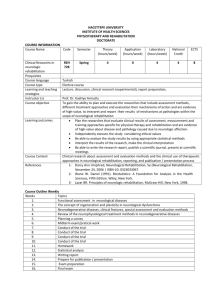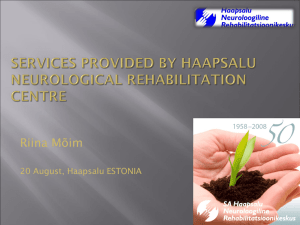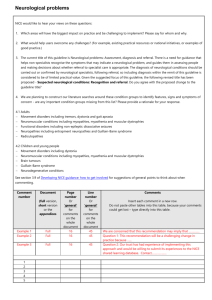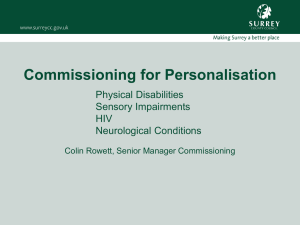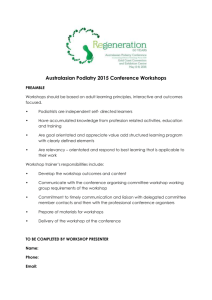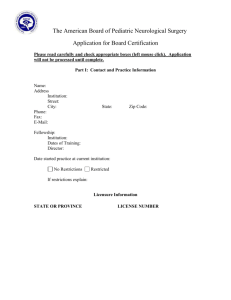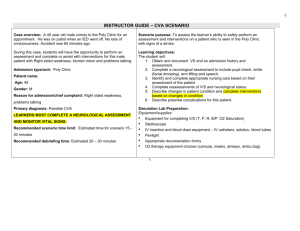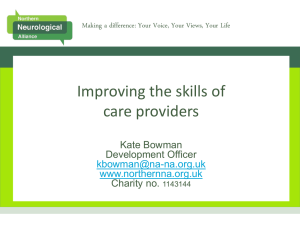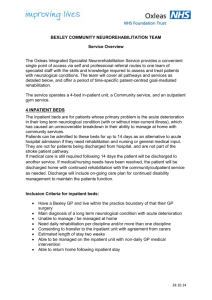PT506
advertisement
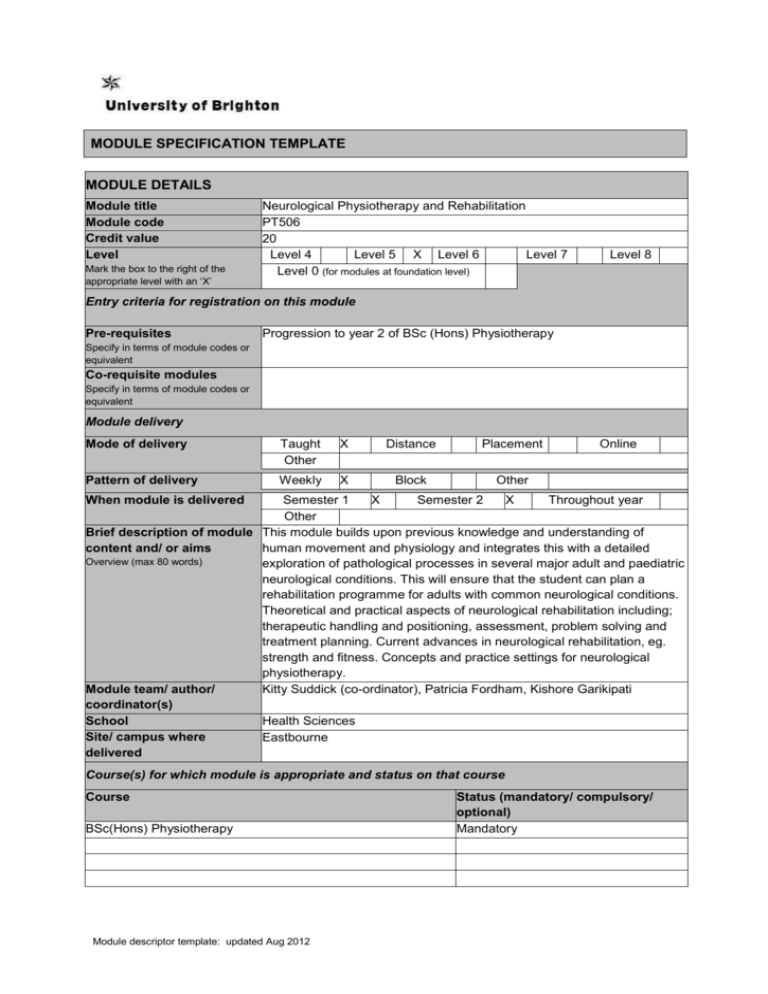
MODULE SPECIFICATION TEMPLATE MODULE DETAILS Module title Module code Credit value Level Mark the box to the right of the appropriate level with an ‘X’ Neurological Physiotherapy and Rehabilitation PT506 20 Level 4 Level 5 X Level 6 Level 7 Level 0 (for modules at foundation level) Level 8 Entry criteria for registration on this module Pre-requisites Progression to year 2 of BSc (Hons) Physiotherapy Specify in terms of module codes or equivalent Co-requisite modules Specify in terms of module codes or equivalent Module delivery Mode of delivery Taught Other X Distance Placement Pattern of delivery Weekly X Block Other Online When module is delivered Semester 1 X Semester 2 X Throughout year Other Brief description of module This module builds upon previous knowledge and understanding of content and/ or aims human movement and physiology and integrates this with a detailed Overview (max 80 words) exploration of pathological processes in several major adult and paediatric neurological conditions. This will ensure that the student can plan a rehabilitation programme for adults with common neurological conditions. Theoretical and practical aspects of neurological rehabilitation including; therapeutic handling and positioning, assessment, problem solving and treatment planning. Current advances in neurological rehabilitation, eg. strength and fitness. Concepts and practice settings for neurological physiotherapy. Module team/ author/ Kitty Suddick (co-ordinator), Patricia Fordham, Kishore Garikipati coordinator(s) School Health Sciences Site/ campus where Eastbourne delivered Course(s) for which module is appropriate and status on that course Course BSc(Hons) Physiotherapy Module descriptor template: updated Aug 2012 Status (mandatory/ compulsory/ optional) Mandatory MODULE AIMS, ASSESSMENT AND SUPPORT Aims Learning outcomes To integrate knowledge and understanding of the role of the nervous system in the control of human movement with an exploration of pathological processes in a number of major adult and paediatric neurological conditions. To build on the foundations of practical skills acquired in year one. Students will develop problem solving skills and enhanced practical skills in order to provide appropriate treatment and overall management for neurological conditions. To critically evaluate treatment and management approaches for adults with neurological dysfunction in preparation for evidence based practice. On successful completion of the module, students will be able to: explain pathological processes in major adult and paediatric neurological conditions and the problems that occur formulate specific holistic rehabilitation and management plans for people with neurological conditions considering the physical psychological and social consequences to the individual, carers, parents, and community demonstrate clinical problem solving, assessment, goal setting, treatment planning and evaluation skills apply current theoretical and scientific evidence underpinning the use of practical physiotherapy skills in adult neurological rehabilitation. competently demonstrate a range of appropriate treatment techniques for adults with neurological conditions utilise and evaluate outcome measurements for neurological physiotherapy. critically evaluate the best available evidence for Neurological Physiotherapy and Rehabilitation from a variety of sources and discuss this evidence in relationship to adult and paediatric neurological conditions, and therapy approaches. understand the process of normal neurological development. Content Adult Neurological conditions to include: Stroke, Parkinson’s Disease, Spinal Cord Injury, Multiple Sclerosis, Motor Neurone Disease, Guillain-Barre Syndrome, Acquired Brain Injury. Paediatric conditions to include Cerebral Palsy, Down’s Syndrome. The module will cover normal neurological development and consider the importance of the achievement of developmental milestones. This module has been designed to build on the foundations of practical skills acquired in year one. Students will develop clinical reasoning, problem solving skills and enhanced practical skills in order to provide appropriate treatment and overall management for a variety of patient groups. The application of theoretical knowledge from other modules will be emphasised to facilitate integration between theory and practice. Current advances in neurological rehabilitation: for example: strength and fitness in Neuro – rehabilitation. Concepts in neurological physiotherapy and neurological rehabilitation. Learning support Module handbook, practical handbook, theory workbook, videos, indicative reading list Bromley, I (2006). Tetraplegia and Paraplegia. A Guide for Physiotherapists. 6th edition, Edinburgh, Churchill Livingstone. Carr, J & Shepherd, R (2010). Neurological Rehabilitation: Optimizing Motor Performance. 2nd edition, Edinburgh, Churchill Livingstone. Carr, J & Shepherd, R (2003). Stroke Rehabilitation: Guidelines for Exercise Training to Optimize Motor Skill. Edinburgh, Butterworth Heinemann. Crossman, AR & Neary, D (2010). Neuroanatomy: An Illustrated Colour Module descriptor template: updated Aug 2012 Text. 4th edition, Edinburgh, Churchill Livingstone. Edwards, S (2002). Neurological Physiotherapy: A Problem Solving Approach. 2nd edition, New York, Churchill Livingstone. Hinchcliffe, A. (2007) Children with Cerebral Palsy: A Manual for Therapists, Parents and Community Workers, 2nd Ed edition, SAGE Publications Ltd. Lennon, S. & Stokes, M. (2009). Pocketbook of Neurological Physiotherapy. Edinburgh, Churchill Livingstone. Levitt, S. (2004). Treatment of Cerebral Palsy and Motor Delay. Oxford, Blackwell Scientific Publications. Lindsay, KW & Bone, I (2010) Neurology and Neurosurgery Illustrated. 5th edition, Edinburgh, Churchill Livingstone. Raine, S., Meadows, L., and Lynch-Ellerington, M. (2009). Bobath Concept: Theory and Clinical Practice in Neurological Rehabilitation. Chichester, Wiley-Blackwell. Sheridan, MD. (1997) From birth to five years: Children’s developmental progress. Routledge. Sheridan, MD. (1999). Play in early childhood: from birth to six years. Routledge. Stokes, M and Stack E. (Ed.) (2011). Physical Management in Neurological Rehabilitation.3rd edition, Edinburgh, Elsevier Mosby Ltd. http://www.dsa-uk.com/DSA_lstLiterature.aspx Down’s Syndrome Association http://www3.who.int/icf/icftemplate.cfm International classification of functioning disability and health (ICF)@ http://www.cochrane.org/reviews/ (Cochrane reviews) http://www.dh.gov.uk/PolicyAndGuidance/HealthAndSocialCareTopics/LongTermCo nditions/fs/en (National Service Framework for long term condition http://hces.unn.ac.uk/guidelines/ (The Physiotherapy Guidelines for Parkinson’s disease) www.mssociety.org.uk (website of the Multiple Sclerosis Society). www.nice.org.uk/cat.asp?c=89907 (NICE guidelines for the management of Multiple Sclerosis published 2004). http://www.nice.org.uk/nicemedia/pdf/CG56QuickRedGuide.pdf (NICE quick reference guidelines for Head Injury, including assessment and early management. http://www.ninds.nih.gov/ (The National Institute of Neurological Disorders and Stroke). http://www.rcplondon.ac.uk/ (National Clinical Guidelines for Stroke). http://www.sign.ac.uk/guidelines/ (SIGN guidelines for stroke (Guideline number 64)). http://www.spinal.co.uk/ (website of the Spinal Injuries Association in the UK). Teaching and learning activities Module descriptor template: updated Aug 2012 Details of teaching and learning activities Lectures, tutorials and practical sessions. A module handbook, practical handbook and theory workbook will be used facilitate learning throughout the module. Prereading, Practical demonstrations, individual student supervision, and self directed learning. Web based resources and support. Videos and on line quizzes and discussion boards. Critical appraisal of research articles. Case scenarios and videos will be used throughout module involving clinical and real life situations and cases, and linking theory and practical application. Allocation of study hours (indicative) Study hours Where 10 credits = 100 learning hours SCHEDULED This is an indication of the number of hours students can expect to spend in scheduled teaching activities including lectures, seminars, tutorials, project supervision, demonstrations, practical classes and workshops, supervised time in workshops/ studios, fieldwork, external visits, and work-based learning. GUIDED INDEPENDE NT STUDY All students are expected to undertake guided independent study which includes wider reading/ practice, follow-up work, the completion of assessment tasks, and revisions. PLACEMENT The placement is a specific type of learning away from the University that is not work-based learning or a year abroad. TOTAL STUDY HOURS 1-2 hour lecture/Camtasia per week 27 hours 1-2 hour tutorials per week 24 hours 2 hours practical per week 32 hours Workbook: completion of sections prior to lecture/Camtasia, reading research articles for tutorials 117 hours 200 Assessment tasks Details of assessment for this module Practical examination of the skills and theory taught during the module (100% of the overall mark). A pass mark of 40% must be achieved in the assessment. Types of assessment task1 % weighting Indicative list of summative assessment tasks which lead to the award of credit or which are required for progression. (or indicate if component is pass/fail) WRITTEN Written exam COURSEWO RK Written assignment/ essay, report, dissertation, portfolio, project output, set exercise PRACTICAL Oral assessment and presentation, practical skills assessment, set exercise 100% EXAMINATION INFORMATION Area examination board BSc(Hons) Physiotherapy Refer to Faculty Office for guidance in completing the following sections External examiners 1 Set exercises, which assess the application of knowledge or analytical, problem-solving or evaluative skills, are included under the type of assessment most appropriate to the particular task. Module descriptor template: updated Aug 2012 Name Position and institution Date appointed Date tenure ends Dr Anne Wallace Subject Lead Physiotherapy Robert Gordon University Aberdeen 1/10/13 30/9/17 Dr Iain Beith Head of School of Rehabilitation Sciences, Kingston University and St Georges, University of London 1/10/10 30/9/15 Yes No QUALITY ASSURANCE Date of first approval November 2013 Only complete where this is not the first version Date of last revision Only complete where this is not the first version Date of approval for this version 28/7/14 Version number 2 Modules replaced Specify codes of modules for which this is a replacement Available as free-standing module? Module descriptor template: updated Aug 2012 X
